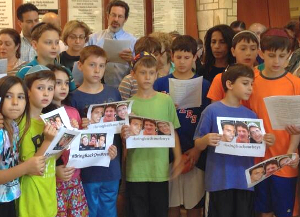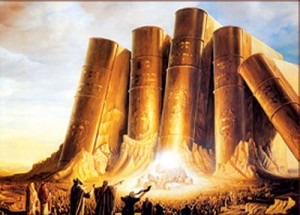Ordinarily, TV portrayal of Orthodox Jews isn’t worthy of comment (even for those who own one). A degree of negativity, something to make us uncomfortable, is practically to be expected. That writers of fictional TV programs don’t understand our community and misportray it is a given. That the media prefers to focus upon the most negative stories is not only true regarding the Orthodox — and writers and reporters for stories of that kind can usually be counted upon to add a heavy dose of cynicism when the alleged miscreant is perceived as religious.
Even so-called “reality” TV, where the people portraying the Orthodox are Orthodox, is little different. Yes, the kipah-clad kid singing non-Jewish lyrics has a great voice, but he’s singing non-Jewish lyrics. Such is the nature of national TV, where the audience doesn’t want to hear him sing a Shwekey track (or, more apropos, one from Shalshelet).
The most recent such case, though, is different.
First, some background, though you may know all of the following better than I do. There’s a show called “America’s Got Talent” — it’s a national variety show, and apparently gets huge audiences. It’s in a different league than “The Gong Show.” It must be, because countless stories and individuals told me that I just have to watch a clip from its most recent episode… and say something about it.
A talent show of this size attracts fame-seekers like moths to a flame, whether or not they have any talent of record. Producers filter through the hundreds or thousands of applicants, deciding who will get to appear before the judges. The judges determine who will appear on the live shows, at which point people call in to vote for their favorite acts.
So what makes this show, this year, different from the others? It is different because of a sixth-grader who, with Dad’s advice and encouragement, introduced himself as a stand-up comic — and then proceeded to deliver a series of off-color jokes. Oh… and he was wearing a kipah.
Let’s be blunt — he didn’t get on stage on the merit of his comedic genius. Whatever talents he might have, stand-up comedy isn’t it. He opened with “what an honor to be auditioning in front of the best judges in the world” with precisely the same intonation used for “it’s such an honor to read you the script that Daddy gave me on the occasion of my Bar Mitzvah.” It made me cringe. And then he made me cringe for different reasons.
Why did he get onto the show? As mentioned, the staff only send on those whose appearance will make for good viewing — they have to be particularly good, bad, amusing, or shocking. I remember my childhood friend Eric Witt telling jokes in our school’s talent show — if I recall correctly, we were all of one grade older. And just being honest, Eric’s delivery was much smoother. I remember because I was impressed, I didn’t know he would be that good on stage. And needless to say, Eric did not tell, in front of his teachers, the sort of jokes that seventh-grade boys in the secular world share with their friends.
In my opinion, Eric, as good as he was, would not have made it onto the show. Both because he wouldn’t tell that type of joke, and because he didn’t wear a yarmulke.
It’s nothing new that the use of nivul peh, vulgar speech, can make people laugh, masking otherwise mediocre talent. And in general, comedy is a two-edged sword — the Gemara both advises starting a shiur with a milsa d’bedichusa, a joke, and describes one joke as capable of nullifying the benefits of a thousands words of mussar, rebuke. One of my closest teachers and advisers once mentioned how important it is to have a “Torahdig” sense of humor. It is important that we be able to smile and laugh — and equally important not to use humor to profane the holy.
In this case, as shocking as his filth was, I wonder if he could have proceeded past the producers and out onto the stage — much less get through to the next round — without the kipah. A twelve-year-old boy telling jokes of that variety isn’t particularly newsworthy, and his delivery was, as I said, stiff like cardboard.
What is the yarmulke supposed to symbolize? Why does the Torah tell us to look different in the first place? Our mission is to proclaim — in both word and deed — G-d’s Presence in the world. We should strive to represent the highest and holiest of values.
We live at a time when society is going in the opposite direction. What was scandalous a generation ago is commonplace today — in dress, in conduct, and in dialogue. And what did this boy tell the judges, two of whom are Jewish (and one of whom made his career by lowering the standards for broadcast radio)? “You’re right, society is going your way. Even we so-called religious guys, we’re just as gutter-mouthed as you are.” And, to no one’s surprise, they ate it up.
In describing the failures of the criminal justice system twenty years ago, Sen. Daniel Patrick Moynihan coined the term “defining deviancy down,” allowing ever worse behavior to pass as acceptable. And as Mayor of New York, Rudy Giuliani knew that when things are spiraling out of control, you need to compensate. He ordered the police to address even petty crimes, and reversed the trend Moynihan observed.
Chazal told us the same, that you need to push in the opposite direction just to preserve proper standards. Seeing for what passes as acceptable (or even expected) dress for girls and women today, we understand why many Rabbonim push for more care and higher levels of tznius than were tolerated fifty years ago. It’s not only because the community has grown and gained so much internal strength and respect, but because no American woman fifty years ago would dare walk outside in what ten-year-old girls consider “normal” today. It’s not a time to be lax. And confronted with rampant nivul peh, our response must be similar.
Clearly we have reached the time described by the Mishnah when chutzpah yasgi, when to be brazen or bold-faced overruns the world. But the embarrassment to Kavod Shamayim still turns the stomach. No, that level of speech is not acceptable — on the contrary, we should be more careful in Lashon Hora, Ona’as Devarim, Nivul Peh (gossip, hurtful words, and vulgarity) and all other Halachos of speech, as we are surrounded by a generation that has made vulgarity commonplace.
May our doing so be a merit for three other young men — Yaakov Naftali ben Rachel Devorah, Gilad Michael ben Bat Galim, and Eyal ben Iris Teshurah.

 Why does it take an event of this magnitude to unify us?
Why does it take an event of this magnitude to unify us? After they went through the land of Cana’an, these great men came home very discouraged. They knew that the Children of Israel had sinned previously, especially with the Golden Calf. They saw that the inhabitants were giants, and it would take open miracles for Israel to be victorious. So they concluded, erroneously, that Israel was no longer worthy of that level of protection — that G-d’s promise was not unconditional, that they would lose.
After they went through the land of Cana’an, these great men came home very discouraged. They knew that the Children of Israel had sinned previously, especially with the Golden Calf. They saw that the inhabitants were giants, and it would take open miracles for Israel to be victorious. So they concluded, erroneously, that Israel was no longer worthy of that level of protection — that G-d’s promise was not unconditional, that they would lose. Rabbi Shmuel Greineman writes that this is no coincidence. On the second day, Nesanel ben Tzuar of the tribe of Yissachar had to make a decision. What would he do differently than Nachshon ben Aminadav of Yehudah? Each of the remaining ten, of course, would then have to decide how to vary from the earlier ones, inevitably leading to jealousy as each one felt compelled to upstage those who gave previously. So he chose instead to let Nachshon’s gift serve as the template which they all followed. G-d found this so gratifying that He had all twelve gifts recorded in the Torah individually, although they could as easily have been stated collectively.
Rabbi Shmuel Greineman writes that this is no coincidence. On the second day, Nesanel ben Tzuar of the tribe of Yissachar had to make a decision. What would he do differently than Nachshon ben Aminadav of Yehudah? Each of the remaining ten, of course, would then have to decide how to vary from the earlier ones, inevitably leading to jealousy as each one felt compelled to upstage those who gave previously. So he chose instead to let Nachshon’s gift serve as the template which they all followed. G-d found this so gratifying that He had all twelve gifts recorded in the Torah individually, although they could as easily have been stated collectively.